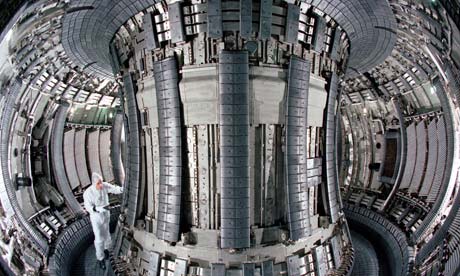Report calls for huge expansion of experimental nuclear plants
Development of new technology would move UK away from fossil fuels and generate two-thirds of power by 2050

JET's fusion reactor, where physicists recreate conditions inside the sun, is the sort of experimental nuclear technology that could help the UK cut its emissions, government scientific advisers say. Photograph: Efda-Jet
The UK will need to develop a huge fleet of currently experimental nuclear reactors by the middle of the century, to generate around two-thirds of the country's electricity supply if it is to meet the most nuclear-intensive scenario for moving away from fossil fuels, according to a report by three of the government's most senior scientific advisers.
The expansion would involve developing nuclear generation technologies that are not currently used commercially anywhere in the world, and would also entail a huge expansion from the current electricity contribution of nuclear power to the UK grid. In 2011, nuclear supplied 18% of electricity demand.
If each reactor has the generating capacity of the Hinkley Point power station that would mean at least a trebling of the current number of reactors – 16 at nine different sites around the country. The eventual number could be much higher because the new unconventional reactors are expected to have a smaller generating capacity.
The expansion is necessary to fill the gap left by fossil fuels such as coal and gas, which the government has pledged to phase out to reduce carbon dioxide emissions.
The report, which is not yet published, encourages development of unconventional alternatives such as "fast reactors" powered off nuclear waste, designs using thorium rather than uranium, and even fusion power. It implies they could help nuclear to provide as much as two-thirds of UK electricity by 2050.
Sir John Beddington, the government's chief scientific adviser, along with David MacKay, the Department of Energy and Climate Change (Decc) chief scientific adviser, and John Perkins, scientific adviser to the Department of Business Innovation and Skills, are the report's authors.
They have already made "a number of recommendations" to ministers based on findings in the report, a Decc spokesman said.
Some of the alternative reactors can burn plutonium "waste" as fuel. GE Hitachi is in discussions with the Nuclear Decommissioning Authority and with Decc to construct two of its Prism fast reactors to burn some of the 100 tonnes of plutonium at Sellafield, helping resolve the waste controversies. The billionaire entrepreneur Richard Branson is among those who have expressed support for fast reactors.
Other technologies highlighted in the Civil Nuclear Industrial Strategy report include the use of thorium, a radioactive chemical element – the proponents of which say is more efficient than uranium and is more difficult to make into a nuclear weapon.
Researchers also want to fashion them into small, "modular" sizes that are more affordable and easier to produce than today's large nuclear power stations, and even transportable.
The report was commissioned in response to a 2011 House of Lords select committee report warning the government risked becoming complacent about the UK's nuclear power research and development (R&D) skills and knowledge. It looks at what would be needed to deliver the more nuclear-heavy of four government scenarios outlined in 2011, which examined how to meet the UK's target of cutting carbon emissions 80% by 2050.
The news comes after a rocky fortnight for conventional power, withCentrica pulling out of a partnership with EDF to build new reactors, MPs warning over the £67.5bn cost of waste at Sellafield and Cumbria council rejecting plans for an underground waste-disposal site.
A Decc spokesman said of the report: "In order to potentially deliver against the upper end of this scope, it is likely that more advanced and diverse options will need to be explored by the market." He added: "Ensuring that these options are not foreclosed or essential skills lost will be an important long-term objective, and the R&D roadmap element of the work will set out a number of pathways and key decision points for any future R&D programmes to consider."
The report is due to be published in the coming months.
No hay comentarios:
Publicar un comentario